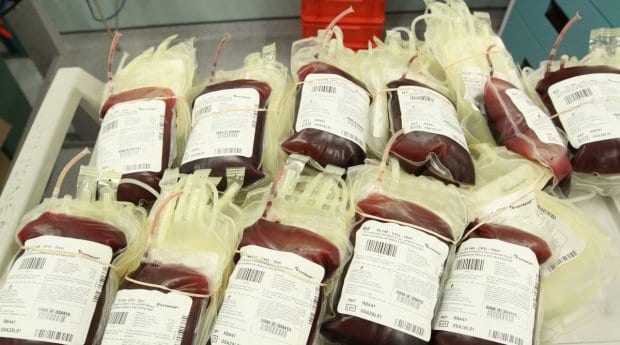Canadian Blood Services (CBS) is hoping to move ahead with a proposal to shorten the deferral period for gay men’s blood donations from five years to one year.
In July 2013, Health Canada changed its policy to allow men who have sex with men to donate blood — as long as they’ve abstained from gay sex for five consecutive years. This replaced a lifetime ban on any man who has had sex with another man at least once since 1977.
Dana Devine, CBS’ chief medical and scientific officer, says the move from a lifetime ban to a five-year deferral has not caused any decrease in the safety of Canada’s blood supply.
“We’re not seeing any change compared to what we were seeing when we had the permanent deferral, and that’s what we want to see,” says Devine, who says she didn’t expect to see a change in the numbers of infectious diseases such as hepatitis C and HIV in the blood supply.
“We made a change and can now show that everything is fine and now we want to look at making the next change,” she says.
Devine says CBS does not have a lot of data on the number of previously deferred men who have donated blood since the five-year deferral replaced the lifetime ban two years ago. “We don’t have that number because we don’t ask that question,” she explains. “We do know that about a couple of hundred people had tried to donate and were deferred, and now they’ve come back and are eligible. We weren’t looking at the first step as a way to get a new slew of donors into the system.”
As with the five-year deferral, CBS will now go forward and consult with stakeholders, including representatives from the LGBT community, as well as patient groups composed of people whose lives depend on blood and blood products. If the stakeholders are amenable to the change, CBS will then submit its proposal to Health Canada, who makes the final decision.
“Now we’ll go back to the same set of folks again and talk about changing the five-year deferral down to 12 months,” Devine says. “It would have been pretty surprising if it was a problem. We’ll then go to Health Canada and that process could take about 12 months. We hope that this next step is implemented sometime in 2016.”
Jennifer Breakspear, executive director of Vancouver’s Options for Sexual Health and co-chair of CBS’s MSM deferral policy working group, is hopeful that the proposed change will go forward as planned.
“It’s the timeline we expected and we have all been supportive of it since we joined the working group,” she says. “It’s mostly a matter of information sharing and figuring out how we can use our resources throughout the various communities to support the proposal. We’re not seeing any change compared to what we are seeing when we had the permanent deferral, and that’s what we want to see.”
Devine says stakeholders will look at data from other countries that have moved to a one-year ban without a noticeable change in the safety of their blood supply.
“When we first went to five years, the United Kingdom [excluding Northern Ireland] went to 12 months but now they have years of data and their deferral looks fine,” she says. “We look at what happens on the international stage and their experience will tell us what we can do. It looks like a perfectly reasonable step for us to make.
On May 12, the US Food and Drug Administration (FDA) unveiled a new policy that would replace its own lifetime ban on gay blood donation with a one-year deferral. The FDA cited evidence from other countries that have adopted a similar policy, such as Argentina, Australia, Brazil, Hungary, Japan, Sweden and the United Kingdom.
US Representative Mike Honda, a long-time supporter of LGBT rights and a California Democrat, denounced the FDA’s proposal in a press release, saying that a new blood policy should focus on behaviour — not orientation.
“While I am glad the FDA finally issued new draft guidance, it falls short of what our country needs — and deserves,” Honda states. “The Williams Institute at UCLA estimates this revised policy will continue to exclude over 2 million men whom otherwise would be eligible to donate, depriving our hospitals of nearly 300,000 pints of blood. I will continue to work with my colleagues in Congress, and in my district, to get the FDA to recognize this policy for what it is: an outdated, orientation-based view of gay and bisexual men.”
Jody Jollimore, program manager at Vancouver’s Health Initiative for Men, says a one-year deferral is a step in the right direction for CBS, but that it still assumes that all gay sex is somehow risky.
“We know that that’s not the case,” he says. “Gay men are having sex every day that does not risk HIV transmission and those people should not be discriminated against when giving blood.”
He says gay men are “very responsible actors” with respect to HIV prevention, and echoes Honda’s call for a behaviour-based donation criteria.
“Not all gay men have anal sex, which means that if you’ve given a blowjob in the last year you are not able to give blood — and that doesn’t make sense when we know that there’s a very low risk for HIV transmission with blowjobs. And we know a lot of gay men who have anal sex use condoms and only have sex with one partner. A one-year deferral still excludes a lot of people.”

 Why you can trust Xtra
Why you can trust Xtra


